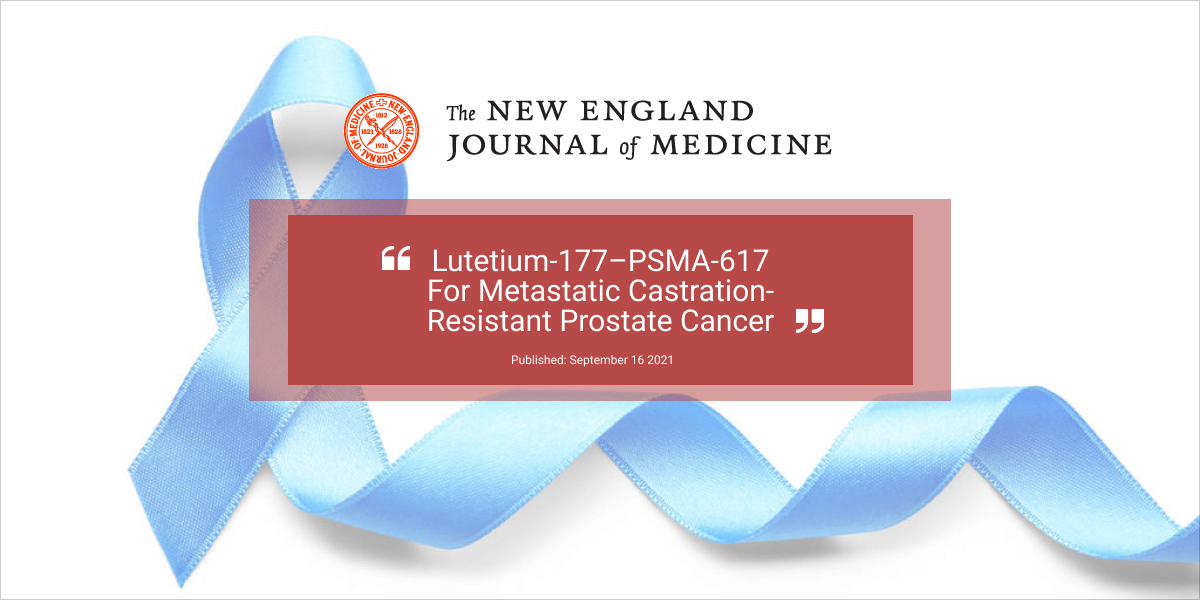Lutetium-177–PSMA-617 for Metastatic Castration-Resistant Prostate Cancer

Lutetium-177–PSMA-617 for Metastatic Castration-Resistant Prostate Cancer
BACKGROUND
Metastatic castration-resistant prostate cancer remains fatal despite recent advances. Prostate-specific membrane antigen (PSMA) is highly expressed in metastatic castration-resistant prostate cancer. Lutetium-177 (177Lu)–PSMA-617 is a radioligand therapy that delivers beta-particle radiation to PSMA-expressing cells and the surrounding microenvironment.
METHODS
We conducted an international, open-label, phase 3 trial evaluating 177Lu-PSMA-617 in patients who had metastatic castration-resistant prostate cancer previously treated with at least one androgen-receptor–pathway inhibitor and one or two taxane regimens and who had PSMA-positive gallium-68 (68Ga)–labeled PSMA-11 positron-emission tomographic–computed tomographic scans. Patients were randomly assigned in a 2:1 ratio to receive either 177Lu-PSMA-617 (7.4 GBq every 6 weeks for four to six cycles) plus protocol-permitted standard care or standard care alone. Protocol-permitted standard care excluded chemotherapy, immunotherapy, radium-223 (223Ra), and investigational drugs. The alternate primary end points were imaging-based progression-free survival and overall survival, which were powered for hazard ratios of 0.67 and 0.73, respectively. Key secondary end points were objective response, disease control, and time to symptomatic skeletal events. Adverse events during treatment were those occurring no more than 30 days after the last dose and before subsequent anticancer treatment.
RESULTS
From June 2018 to mid-October 2019, a total of 831 of 1179 screened patients underwent randomization. The baseline characteristics of the patients were balanced between the groups. The median follow-up was 20.9 months. 177Lu-PSMA-617 plus standard care significantly prolonged, as compared with standard care, both imaging-based progression-free survival (median, 8.7 vs. 3.4 months; hazard ratio for progression or death, 0.40; 99.2% confidence interval [CI], 0.29 to 0.57; P<0.001) and overall survival (median, 15.3 vs. 11.3 months; hazard ratio for death, 0.62; 95% CI, 0.52 to 0.74; P<0.001). All the key secondary end points significantly favored 177Lu-PSMA-617. The incidence of adverse events of grade 3 or above was higher with 177Lu-PSMA-617 than without (52.7% vs. 38.0%), but quality of life was not adversely affected.
CONCLUSIONS
Radioligand therapy with 177Lu-PSMA-617 prolonged imaging-based progression-free survival and overall survival when added to standard care in patients with advanced PSMA-positive metastatic castration-resistant prostate cancer. (Funded by Endocyte, a Novartis company; VISION ClinicalTrials.gov number, NCT03511664. opens in new tab.)
![]() Oliver Sartor, M.D., Johann de Bono, M.B., Ch.B., Ph.D., Kim N. Chi, M.D., Karim Fizazi, M.D., Ph.D., Ken Herrmann, M.D., Kambiz Rahbar, M.D., Scott T. Tagawa, M.D., Luke T. Nordquist, M.D., Nitin Vaishampayan, M.D., Ghassan El-Haddad, M.D., Chandler H. Park, M.D., Tomasz M. Beer, M.D., et al., for the VISION Investigators*
Oliver Sartor, M.D., Johann de Bono, M.B., Ch.B., Ph.D., Kim N. Chi, M.D., Karim Fizazi, M.D., Ph.D., Ken Herrmann, M.D., Kambiz Rahbar, M.D., Scott T. Tagawa, M.D., Luke T. Nordquist, M.D., Nitin Vaishampayan, M.D., Ghassan El-Haddad, M.D., Chandler H. Park, M.D., Tomasz M. Beer, M.D., et al., for the VISION Investigators*
This article was published on June 23, 2021, at NEJM.org.

